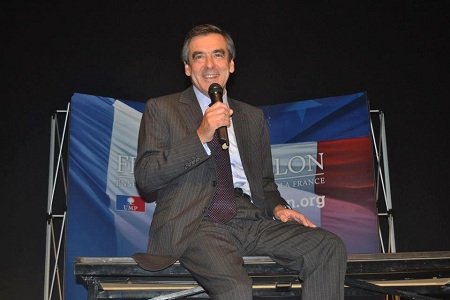France’s center-right Union pour un mouvement populaire (UMP, Union for a popular movement) will vote on Sunday, November 18 to choose its next general secretary in what’s widely seen as a fight to get the upper hand on the UMP’s presidential nomination in 2017. ![]()
The UMP will choose between two key figures — former prime minister François Fillon (pictured above, top) and Jean-François Copé (pictured above, bottom), who has been general secretary since 2010. As the contest approaches, both candidates have accused the other of fraud, marking an ugly end to what has been a dogfight within the French right.
Unlike most French prime ministers, Fillon actually remained in Matignon — the residence of the French prime minister — for all five years of the presidency of Nicolas Sarkozy. Throughout the Sarkozy presidency, he maintained or even gained approval from French voters as a competent and moderate head of government who seemed at times more grounded and focused on Sarkozy’s reforms than even Sarkozy. Indeed, there’s reason to believe that if Fillon had contested the presidential election against the Parti socialiste‘s François Hollande, he might have won.
Fillon, age 58, both urbane and technocratic, seems to hold a clear lead over Copé, age 48 — a recent Harris poll shows Fillon with a 67% to 22% lead among UMP voters, and a wide edge among French voters generally.
As such, Sunday’s vote is a bit of a proxy contest for the UMP’s direction in the years ahead — Fillon represents the moderate center-right and Copé represents a more full-throated hard-right approach. But the next French election is over four years away — in April 2017. In contrast, consider: five years before 2008, no one in the United States had even heard of Barack Obama.
After all, there’s nothing stopping Sarkozy himself for running for a second term in 2017 — many French voters still prefer Sarkozy to either Fillon or Copé for the time being, and Sarkozy has indicated he may be interested.
The winner of Sunday’s contest will have a delicate task in balancing an appeal to the broad center of French voters, while not allowing other political movements steal support on the UMP’s right. Marine Le Pen, who won nearly 18% of the first-round vote of the presidential election in April 2012 will almost certainly try to make a bid to expand her appeal beyond the narrow confines of the far-right Front national and become the strongest candidate of the French right in 2017. Continue reading The French right prepares to choose Sarkozy’s successor (maybe)






